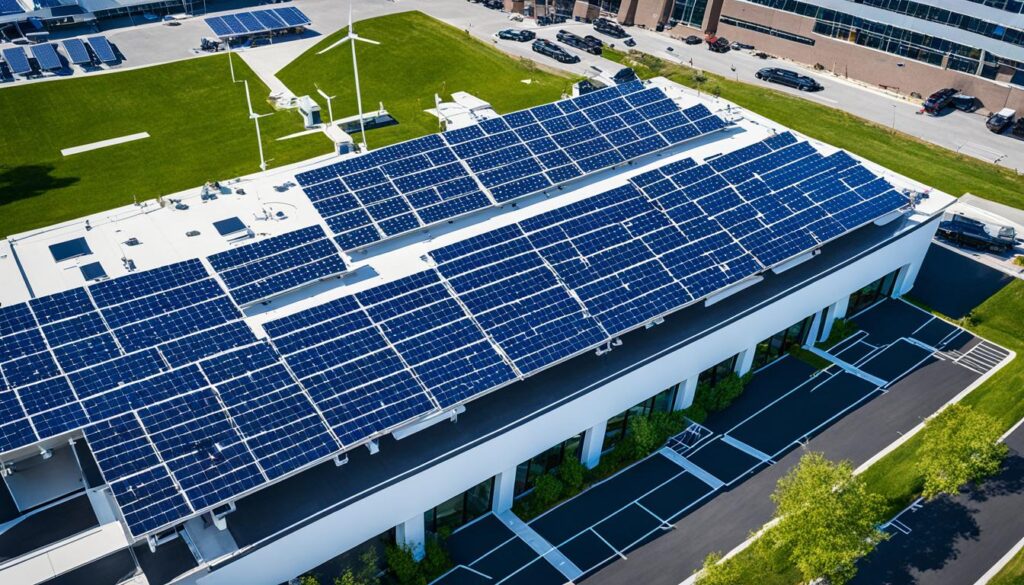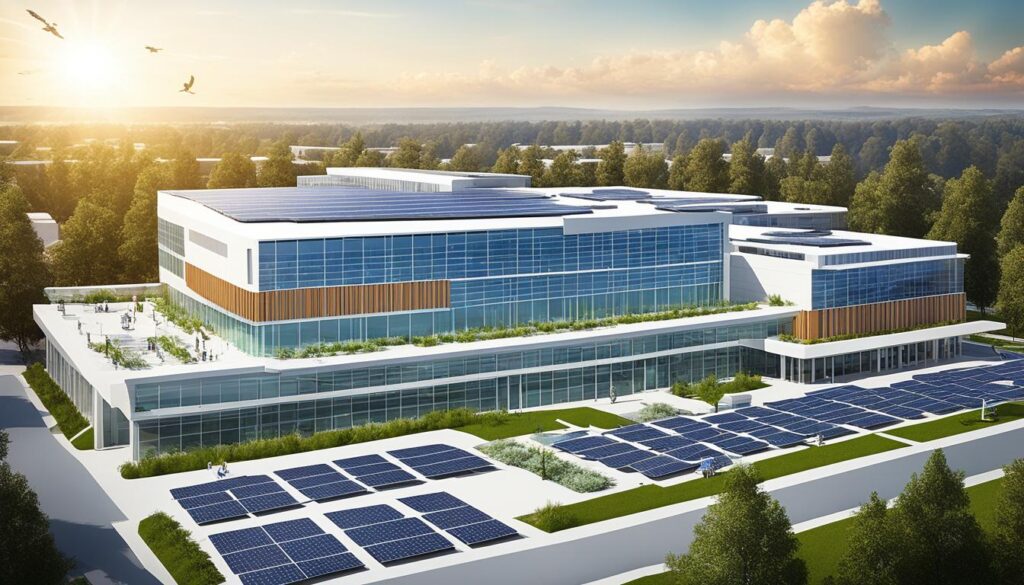Hospitals and healthcare facilities are increasingly turning to solar rooftop installations as a sustainable and eco-friendly energy solution. By harnessing the power of the sun, hospitals can reduce their carbon emissions, lower energy costs, and contribute to a greener future.
In this article, we will explore the imperative of solar energy for healthcare facilities and solar energy benefits for healthcare
Key Takeaways:
- Solar system for hospitals offer a sustainable and eco-friendly energy solution.
- By harnessing solar energy, hospitals can reduce their carbon emissions and lower energy costs.
- Solar energy solutions contribute to a greener future and environmental sustainability.
- Renewable energy is crucial for healthcare facilities to transition towards a more sustainable healthcare system.
- Solar rooftop for hospitals can benefit from increased energy independence and reduced energy bills.
The Imperative of Renewable Energy for Healthcare Facilities
Healthcare facilities have a significant impact on the environment due to their high energy consumption. Adopting renewable energy sources, such as solar power, is crucial for reducing carbon emissions and transitioning towards a sustainable healthcare system.
Renewable energy for medical centers not only helps hospitals meet their energy needs but also offers a range of benefits that contribute to the overall well-being of the facility and the community it serves. By implementing sustainable energy solutions for healthcare, hospitals can:
- Lower energy costs: Solar power systems for hospitals can significantly reduce electricity bills, allowing healthcare facilities to allocate those savings towards improving patient care and medical services.
- Become more resilient: Solar energy provides hospitals with a reliable and resilient source of power, reducing dependency on the grid and minimizing the impact of power outages.
- Attract top-tier talent: Embracing sustainable practices, such as renewable energy, can enhance a hospital’s reputation and attract healthcare professionals who value environmental stewardship.
- Contribute to a greener future: By reducing carbon emissions and dependence on fossil fuels, hospitals that adopt sustainable energy solutions play a vital role in mitigating climate change and creating a healthier environment for patients and communities.
Implementing solar power systems for hospitals not only aligns with the global shift towards renewable energy but also demonstrates a commitment to promoting sustainability within the healthcare industry. The next section will explore the key benefits and types of solar energy solutions available for hospitals, highlighting their potential to transform healthcare facilities into eco-friendly centers.
Key Benefits and Types of Solar Energy Solutions for Hospitals
Exploring Concentrated Solar Power (CSP)
Solar rooftop for hospitals offer numerous benefits, including reduced energy costs, increased energy independence, and environmental sustainability. By harnessing the power of the sun, hospitals can mitigate their impact on the environment and contribute to a greener future. Implementing solar installations for medical facilities is not only a responsible choice but also a strategic investment.
When it comes to solar energy solutions for hospitals, one notable option is Concentrated Solar Power (CSP). CSP systems utilize light-focusing technologies and mirrors to concentrate solar power, making it an ideal choice for large-scale hospital installations. By focusing sunlight onto receivers, CSP systems generate heat that can be used to produce electricity, power HVAC systems, and provide hot water for medical facilities.
| Type of Solar Energy Solution | Key Features |
|---|---|
| Photovoltaic (PV) System | – Converts sunlight directly into electricity – Can be installed on the hospital’s rooftop or in open areas – Requires a relatively large surface area for optimal power generation |
| Solar Thermal System | – Uses the sun’s heat to warm water or air – Suitable for hospitals with high hot water demand or extensive HVAC systems – Requires solar collectors and storage tanks |
| Concentrated Solar Power (CSP) System | – Focuses sunlight using mirrors onto receivers to generate heat – Produces electricity, powers HVAC systems, and provides hot water – Ideal for large-scale hospital installations |
Overall, solar energy solutions provide a range of benefits for hospitals, helping them reduce their energy costs, increase self-sufficiency, and promote sustainability. By exploring various options such as CSP, hospitals can leverage the power of solar installations to create a more eco-friendly and efficient healthcare environment.
How solar rooftop will reduce costing on energy for hospital
One of the key advantages of rooftop solar panels for hospitals is the significant cost savings they can provide. By generating clean and renewable energy from the sun, hospitals can reduce their dependence on traditional energy sources and lower their energy bills.
This section explores how solar rooftops can help hospitals save money on energy costs and allocate those savings towards improving patient care and medical services.
Solar Rooftop for Hospitals: Case Studies
Real-world case studies of hospitals that have implemented solar rooftop installations can provide valuable insights into the benefits and challenges of adopting this sustainable energy solution. These case studies serve as examples for other hospitals looking to transition to solar energy and showcase the positive impact that solar rooftop projects have had on energy savings, carbon reduction, and overall sustainability in healthcare facilities.
“Our hospital’s decision to install rooftop solar panels has been a game-changer. Not only have we significantly reduced our energy costs, but we have also become more environmentally conscious. The solar panels have had a direct impact on our carbon footprint and have positioned us as leaders in sustainable healthcare.” – Dr. Anjali Sharma, CEO of Sunshine Hospital.
One such case study is Sunshine Hospital, a leading medical facility in Mumbai, India. They installed rooftop solar panels to generate clean and renewable energy for their operations. By harnessing the power of sunlight, Sunshine Hospital has reduced their dependence on conventional energy sources and lowered their energy bills, allowing them to allocate those savings towards enhancing patient care and medical services.
Another successful example of solar installations for medical facilities can be seen at Sunrise Medical Center in Chennai. They integrated solar rooftop panels into their infrastructure, resulting in substantial energy savings. Additionally, the solar energy generated has helped reduce their carbon emissions, contributing to a healthier environment and a greener future.

These case studies demonstrate the potential of solar rooftop installations in the healthcare sector. By embracing this sustainable energy solution, hospitals can not only improve their environmental impact but also set an example for other industries to follow. The positive outcomes achieved by these hospitals serve as inspiration for all medical facilities considering the adoption of solar energy, encouraging a transition towards a more sustainable and resilient healthcare system.
Conclusion
In conclusion, the adoption of solar rooftop for hospitals is a crucial step towards achieving sustainable healthcare. By embracing solar energy, hospitals can reduce their carbon footprint, lower energy costs, and contribute to a greener future. This shift towards renewable energy sources, such as solar power, not only benefits hospitals but also has a positive impact on the broader health services industry.
Striding Towards Sustainable Healthcare
By incorporating solar installations, medical centers can actively participate in the global movement towards sustainable healthcare practices. The use of solar energy in hospitals promotes environmental stewardship and demonstrates the commitment of healthcare providers to prioritizing the well-being of both patients and the planet. This transition opens doors to a more eco-friendly approach, transforming healthcare facilities into beacons of sustainable practices.
The Broad Impact of Solar Adoption in Health Services
The benefits of solar adoption extend beyond the individual hospital level. The widespread implementation of solar rooftop installations in medical facilities can lead to a reduction in the overall greenhouse gas emissions of the healthcare sector, making a significant contribution to combatting climate change. Additionally, the lower energy costs associated with solar power can free up resources that hospitals can then allocate towards enhancing patient care and improving medical services.
Overall, the adoption of solar energy solutions in medical centers holds the potential to revolutionize the healthcare industry. It enables hospitals to lead by example in creating a more sustainable future while simultaneously improving the quality of care provided to patients. By harnessing the power of the sun, healthcare facilities can stride towards sustainable healthcare and make a positive impact on both the environment and the communities they serve.
FAQ
What are the benefits of solar rooftop for hospitals?
Solar rooftop installations offer several benefits for hospitals, including reduced energy costs, increased energy independence, and environmental sustainability. By generating clean and renewable energy from the sun, hospitals can lower their dependence on traditional energy sources and lower their energy bills.
How can solar rooftop installations help hospitals save money on energy costs?
Solar rooftops enable hospitals to generate their own electricity from the sun, reducing their reliance on the grid and lowering energy costs. The energy generated from solar panels can offset a significant portion of a hospital’s electricity consumption, resulting in substantial savings over time.
Are there any real-world examples of hospitals that have implemented solar rooftop installations?
Yes, there are several successful case studies of hospitals that have embraced solar rooftop installations. These projects have demonstrated significant energy savings, reduced carbon emissions, and enhanced sustainability. These case studies serve as examples for other hospitals looking to transition to solar energy.
How does solar rooftop installation contribute to a greener future for hospitals?
Solar rooftop installations help hospitals reduce their carbon footprint and contribute to a greener future by generating clean and renewable energy. By harnessing the power of the sun, hospitals can minimize their environmental impact and prioritize sustainability in their operations.
What types of solar energy solutions are available for hospitals?
Hospitals can implement various types of solar energy solutions, including rooftop solar panels, concentrated solar power (CSP), and solar power systems. Each solution has its own advantages and considerations, and healthcare facilities can choose the one that best suits their unique needs and requirements.

